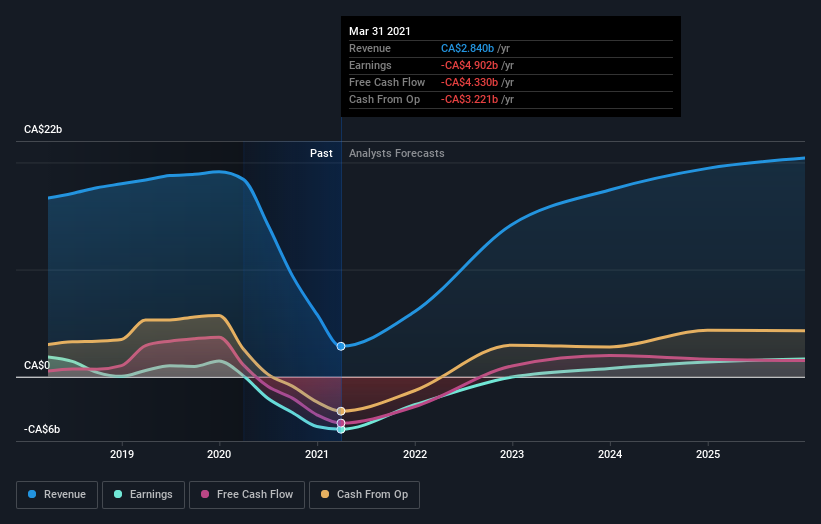Earnings Update: Air Canada (TSE:AC) Just Reported And Analysts Are Trimming Their Forecasts
Last week saw the newest quarterly earnings release from Air Canada (TSE:AC), an important milestone in the company's journey to build a stronger business. Revenues of CA$729m beat expectations by a respectable 8.1%, although statutory losses per share increased. Air Canada lost CA$3.90, which was 31% more than what the analysts had included in their models. This is an important time for investors, as they can track a company's performance in its report, look at what experts are forecasting for next year, and see if there has been any change to expectations for the business. We thought readers would find it interesting to see the analysts latest (statutory) post-earnings forecasts for next year.
See our latest analysis for Air Canada
Taking into account the latest results, the most recent consensus for Air Canada from 16 analysts is for revenues of CA$6.06b in 2021 which, if met, would be a substantial 113% increase on its sales over the past 12 months. Losses are predicted to fall substantially, shrinking 57% to CA$6.95. Before this latest report, the consensus had been expecting revenues of CA$7.11b and CA$6.17 per share in losses. There's been a definite change in sentiment in this update, with the analysts administering a notable cut to next year's revenue estimates, while at the same time increasing their loss per share forecasts.
There was no major change to the consensus price target of CA$28.72, signalling that the business is performing roughly in line with expectations, despite lower earnings per share forecasts. Fixating on a single price target can be unwise though, since the consensus target is effectively the average of analyst price targets. As a result, some investors like to look at the range of estimates to see if there are any diverging opinions on the company's valuation. Currently, the most bullish analyst values Air Canada at CA$35.00 per share, while the most bearish prices it at CA$24.00. There are definitely some different views on the stock, but the range of estimates is not wide enough as to imply that the situation is unforecastable, in our view.
Taking a look at the bigger picture now, one of the ways we can understand these forecasts is to see how they compare to both past performance and industry growth estimates. For example, we noticed that Air Canada's rate of growth is expected to accelerate meaningfully, with revenues forecast to exhibit 175% growth to the end of 2021 on an annualised basis. That is well above its historical decline of 5.7% a year over the past five years. Compare this against analyst estimates for the broader industry, which suggest that (in aggregate) industry revenues are expected to grow 24% annually. Not only are Air Canada's revenues expected to improve, it seems that the analysts are also expecting it to grow faster than the wider industry.
The Bottom Line
The most important thing to note is the forecast of increased losses next year, suggesting all may not be well at Air Canada. They also downgraded their revenue estimates, although industry data suggests that Air Canada's revenues are expected to grow faster than the wider industry. There was no real change to the consensus price target, suggesting that the intrinsic value of the business has not undergone any major changes with the latest estimates.
With that in mind, we wouldn't be too quick to come to a conclusion on Air Canada. Long-term earnings power is much more important than next year's profits. We have forecasts for Air Canada going out to 2025, and you can see them free on our platform here.
However, before you get too enthused, we've discovered 2 warning signs for Air Canada (1 is a bit unpleasant!) that you should be aware of.
This article by Simply Wall St is general in nature. It does not constitute a recommendation to buy or sell any stock, and does not take account of your objectives, or your financial situation. We aim to bring you long-term focused analysis driven by fundamental data. Note that our analysis may not factor in the latest price-sensitive company announcements or qualitative material. Simply Wall St has no position in any stocks mentioned.
Have feedback on this article? Concerned about the content? Get in touch with us directly. Alternatively, email editorial-team (at) simplywallst.com.

